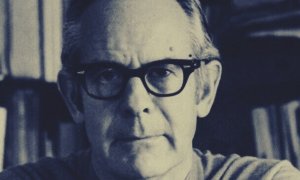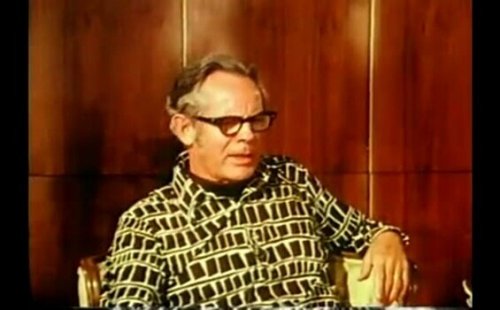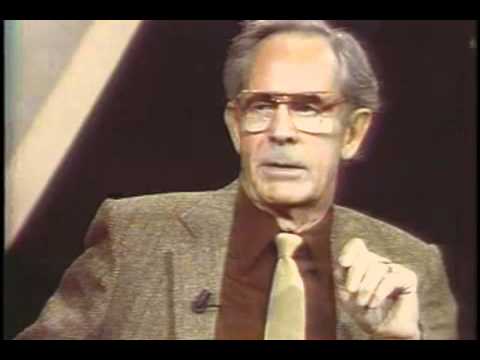Existentialism According to Rollo May

Rollo May is a very interesting figure in psychology. Even though people usually link him to humanistic psychology and even psychoanalysis, his main approach was existential psychology. This is a rather striking approach that combines psychology and philosophy.
Rollo May was born in Ohio (United States) in 1909. He passed away in San Francisco in 1994. He was a member of a middle-class family and was surrounded by an anti-intellectual environment. His parents divorced when he was in high school. His sister had a major mental breakdown and May had to stop studying in order to go back home and take care of his mother, sister, and younger brother.
“It is an ironic habit of human beings to run faster when they have lost their way.”
-Rollo May-
All these experiences scarred May’s psyche. In fact, he suffered from depression many times. When he finished his studies, he went to Greece. That’s where he acquired a deep philosophical spirit. He became fascinated with philosophy from that point on.
Rollo May’s education
When he returned from Greece, he enrolled himself in the Union Theological Seminary in New York. He didn’t want to become a priest. He just wanted to reflect on the things that interested him such as suicide, desperation, and anxiety. Psychology didn’t pay much attention to those topics back then.
He met Paul Tillich, a theologian he became life-long friends with, at the Union Theological Seminary. Unfortunately, May caught tuberculosis and, for that reason, stopped studying temporarily and was transferred to a hospital. He spent more than three years there.

During that time, he read many different and unforgettable pieces of work. He read every single one of Freud‘s writings, as well as Søren Kierkegaard’s books. Although he appreciated the contributions of psychoanalysis, he reached the conclusion that existentialism expressed what human beings experienced during crises more appropriately.
“Life comes from physical survival; but the good life comes from what we care about.”
-Rollo May-
A new direction
When he recovered from tuberculosis, he became a new man. In 1938, he returned to New York to finish his theology studies. After that, he decided to study psychoanalysis and got his Ph.D. in psychology at Columbia University.
Rollo May was also really interested in humanistic psychology. From what he read and his reflections, he was able to define what existential psychology consisted of. It rested on four pillars:
- Humans have antagonistic forces inside of them and this leads to anguish, which is also the driving force of their lives.
- The meaning that each person gives to their life is reflected in their decisions and commitment.
- Human beings don’t have to be one way or another. Everyone is, becomes, and creates themselves.
- Psychotherapy helps to look beyond the obvious and interpret the signs that appear in an individual’s life.
Rollo May’s theory
Since he was an existential psychologist, existence and freedom were the central themes of Rollo May’s analyses. He believed that human beings constantly faced the dilemma of being an object and a subject at the same time. Humans are objects because other people’s actions affect them, but they’re also active agents of their own individual realities.

He considered that conflict is the very essence of life. The mere fact of existing already raises a series of conflicts humans never get to fully resolve. Said conflicts aren’t external. On the contrary, they’re all inside of us. However, they’re not negative, they’re just conditions of existence itself.
The existential psychotherapy Rollo May proposed is a process by which people explore the existence of those individuals who ask for help. It seeks to determine said individuals’ concerns and analyzes them through dialogue. Its goal is to identify prejudice and detect the things that lead to negative consequences. This type of psychotherapy doesn’t necessarily lead to well-being, but to a more rational way of facing life.
“The purpose of psychotherapy is to set people free.”
-Rollo May-
Rollo May is a very interesting figure in psychology. Even though people usually link him to humanistic psychology and even psychoanalysis, his main approach was existential psychology. This is a rather striking approach that combines psychology and philosophy.
Rollo May was born in Ohio (United States) in 1909. He passed away in San Francisco in 1994. He was a member of a middle-class family and was surrounded by an anti-intellectual environment. His parents divorced when he was in high school. His sister had a major mental breakdown and May had to stop studying in order to go back home and take care of his mother, sister, and younger brother.
“It is an ironic habit of human beings to run faster when they have lost their way.”
-Rollo May-
All these experiences scarred May’s psyche. In fact, he suffered from depression many times. When he finished his studies, he went to Greece. That’s where he acquired a deep philosophical spirit. He became fascinated with philosophy from that point on.
Rollo May’s education
When he returned from Greece, he enrolled himself in the Union Theological Seminary in New York. He didn’t want to become a priest. He just wanted to reflect on the things that interested him such as suicide, desperation, and anxiety. Psychology didn’t pay much attention to those topics back then.
He met Paul Tillich, a theologian he became life-long friends with, at the Union Theological Seminary. Unfortunately, May caught tuberculosis and, for that reason, stopped studying temporarily and was transferred to a hospital. He spent more than three years there.

During that time, he read many different and unforgettable pieces of work. He read every single one of Freud‘s writings, as well as Søren Kierkegaard’s books. Although he appreciated the contributions of psychoanalysis, he reached the conclusion that existentialism expressed what human beings experienced during crises more appropriately.
“Life comes from physical survival; but the good life comes from what we care about.”
-Rollo May-
A new direction
When he recovered from tuberculosis, he became a new man. In 1938, he returned to New York to finish his theology studies. After that, he decided to study psychoanalysis and got his Ph.D. in psychology at Columbia University.
Rollo May was also really interested in humanistic psychology. From what he read and his reflections, he was able to define what existential psychology consisted of. It rested on four pillars:
- Humans have antagonistic forces inside of them and this leads to anguish, which is also the driving force of their lives.
- The meaning that each person gives to their life is reflected in their decisions and commitment.
- Human beings don’t have to be one way or another. Everyone is, becomes, and creates themselves.
- Psychotherapy helps to look beyond the obvious and interpret the signs that appear in an individual’s life.
Rollo May’s theory
Since he was an existential psychologist, existence and freedom were the central themes of Rollo May’s analyses. He believed that human beings constantly faced the dilemma of being an object and a subject at the same time. Humans are objects because other people’s actions affect them, but they’re also active agents of their own individual realities.

He considered that conflict is the very essence of life. The mere fact of existing already raises a series of conflicts humans never get to fully resolve. Said conflicts aren’t external. On the contrary, they’re all inside of us. However, they’re not negative, they’re just conditions of existence itself.
The existential psychotherapy Rollo May proposed is a process by which people explore the existence of those individuals who ask for help. It seeks to determine said individuals’ concerns and analyzes them through dialogue. Its goal is to identify prejudice and detect the things that lead to negative consequences. This type of psychotherapy doesn’t necessarily lead to well-being, but to a more rational way of facing life.
“The purpose of psychotherapy is to set people free.”
-Rollo May-
All cited sources were thoroughly reviewed by our team to ensure their quality, reliability, currency, and validity. The bibliography of this article was considered reliable and of academic or scientific accuracy.
- May, R. (1990). Amor y voluntad: las fuerzas humanas que dan sentido a nuestra vida. Gedisa Mexicana.
- May, R. (1968). El dilema existencial del hombre moderno. Paidos.
- May, R. (1988). Libertad y destino en psicoterapia. Desclée de Brouwer.
This text is provided for informational purposes only and does not replace consultation with a professional. If in doubt, consult your specialist.







